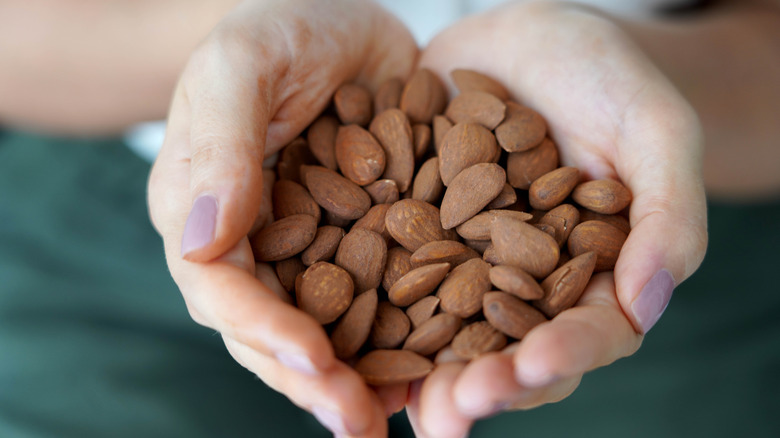
Jill Biden’s Daily Diet Includes A Nutrient-Dense Snack With Cholesterol-Lowering Benefits – Health Digest
Now that Jill Biden is no longer serving as First Lady, she’s been keeping a relatively low profile when it comes to politics. But that doesn’t mean she’s stepped away from public service. Recently, she gave the keynote speech at a center in Poland that provides psychological support to women and children who’ve fled Ukraine.
So how does the former FLOTUS stay so energized at 74? She told Parade shortly after her husband took office that she’s a healthy eater who’s always on the lookout for fresh fruits and veggies. Her go-to snack? Almonds — one of the healthiest options out there compared to all the ultra-processed food in stores.
A single ounce of almonds might not look like much, but it packs a serious nutritional punch for just 164 calories. You get 6 grams of protein and over 3 grams of fiber to help keep you full between meals. And most of the 14 grams of fat in almonds comes from heart-healthy unsaturated fats, which can help lower your cholesterol.
How almonds lower cholesterol
You may see your cholesterol levels rise if you eat a diet high in saturated fat, trans fat, added sugar, and refined carbohydrates. On the other hand, plant-based protein, fiber, unsaturated fats, and plant stanols and sterols can help lower cholesterol by reducing its absorption and promoting its removal from the body. Almonds contain all of these cholesterol-lowering nutrients.
In a 2015 study in the Journal of the American Heart Association, people with elevated LDL (“bad”) cholesterol ate either 1.5 ounces of almonds per day or a low-fat muffin as part of their diet for six weeks. When participants ate almonds, their LDL cholesterol dropped by 5.3 points, and their overall lipid profile improved. Researchers credited the cholesterol-lowering benefits to nutrients in almonds like oleic acid (a heart-healthy fat), fiber, plant sterols, and other natural compounds that help lower cholesterol.
Even if your cholesterol levels are in a healthy range, almonds can help you maintain them — or even reduce body fat — depending on when you eat them. A 2017 study in Nutrition Research and Practice looked at this by dividing participants into three groups. One group snacked on a total of 2 ounces (56 grams) of almonds throughout the day, another ate about 20 grams of almonds before each meal, and a third group ate cookies instead. The group that ate almonds before meals lost belly fat and reduced their overall body fat percentage, while the almond snackers lowered their total and LDL (“bad”) cholesterol levels.
The benefits of almonds beyond lowering cholesterol
Jill Biden may also know that the benefits of almonds go beyond just lowering cholesterol. While managing cholesterol is one way to reduce your risk of heart disease, almonds can also help with other risk factors. According to a 2020 review in the Journal of King Saud University – Science, almonds may help lower blood pressure, thanks to antioxidant flavonoids and L-arginine, which help relax and open up blood vessels.
You might be put off by the calorie content of almonds, but a 2021 review in Nutrients found that eating about an ounce a day can actually help you manage your weight. Almonds can curb your appetite, so you eat less, and they may also help you burn more calories at rest.
The fiber, healthy fats, and plant compounds in almonds also support a healthy gut microbiome, which plays a key role in reducing inflammation and the risk of chronic disease. Almonds encourage the growth of “good” gut bacteria that help strengthen the gut lining, support the immune system, and guard against harmful bacteria. When you eat almonds, your gut bacteria produce short-chain fatty acids that help regulate blood sugar and may offer protection against colon cancer.





